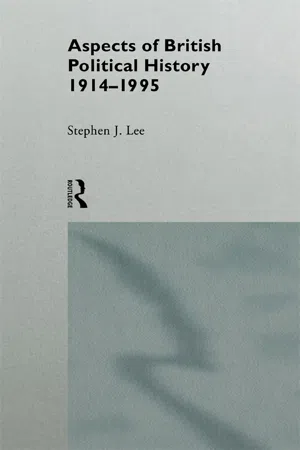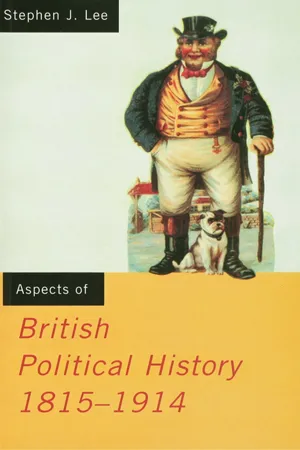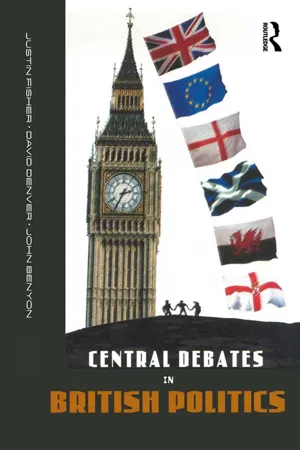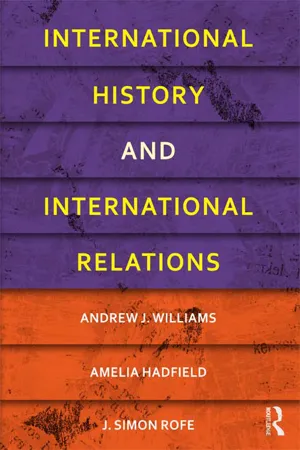Politics & International Relations
UK Political History
The political history of the UK encompasses a rich tapestry of events, including the development of parliamentary democracy, the expansion of the British Empire, and significant social and political reforms. Key moments include the Magna Carta in 1215, the Glorious Revolution of 1688, the establishment of the welfare state after World War II, and the UK's entry into the European Union in 1973.
Written by Perlego with AI-assistance
Related key terms
5 Key excerpts on "UK Political History"
- eBook - ePub
- Stephen J. Lee(Author)
- 2005(Publication Date)
- Routledge(Publisher)
1 INTRODUCTION TO BRITISH POLITICAL HISTORY 1914–95
Like its predecessor, Aspects of British Political History 1815–1914, this book is intended to introduce the reader to a range of interpretations on modern Britain. It is designed to act as a basic text for the sixth-form student and to introduce the undergraduate to the increasingly wide range of ideas and research. I hope it will also capture the imagination of the general reader who likes to go beyond narrative into the realm of debate.Why political history? And what does it mean? During the 1970s and 1980s there was an outpouring of books specifically on social and economic history, a departure from the older type of text, which aimed to cover all areas but within the broad context of political history. To some extent the focus on social and economic history is part of a process of establishing a new balance. In the words of G.R.Elton, the reaction against political history, ‘although often ill-informed and sometimes silly, has its virtues. These arise less from the benefits conferred upon other ways of looking at the past, than from the stimulus given to political history to improve itself.’1Political history now seems to be making a determined comeback, although in a more eclectic form, covering a wider spectrum and drawing from social and economic issues. It is also based more on controversy and debate and less on straight narrative.Political history may be defined as ‘the study of the organisation and operation of power in past societies’.2 It focuses on people in positions of authority; on the impact of their power on the various levels of society; on the response of the people in authority to pressures from below; and on relationships with power bases in other countries. The study of political history fulfils three functions. One is the specific analysis of the acquisition, use and loss of power by individuals, groups, parties and institutions. A second is more generally to provide a meeting point for all other components: social, economic, intellectual and religious—these can all be brought into the arena of political history. But above all, political history offers the greatest potential for controversy and debate. As Hutton maintains, ‘More than any other species of history, it involves the destruction of myths, often carefully conceived and propagated. No other variety of historian experiences to such a constant, and awesome, extent, the responsibility of doing justice to the dead’.3 - eBook - ePub
- Stephen J. Lee(Author)
- 2013(Publication Date)
- Routledge(Publisher)
1 AN INTRODUCTION TO BRITISH POLITICAL HISTORY 1815–1914This book is intended to introduce the reader to a range of interpretations on nineteenth- and early twentieth-century British political history. It is designed to act as a basic text for the sixth-form student and to introduce the undergraduate to the wide range of ideas and research relating to the period. I hope it will also capture the imagination of the general reader who likes to go beyond narrative into the realm of debate.Why political history? And what does it mean? During the 1970s and 1980s there was an outpouring of books specifically on social and economic history, a departure from the older type of text which aimed to cover all areas but within the broad context of political history. To some extent the focus on social and economic history is part of a process of establishing a new balance. In the words of G.R. Elton, the reaction against political history, ‘although often ill-informed and sometimes silly, has its virtues. These arise less from the benefits conferred upon other ways of looking at the past than from the stimulus given to political history to improve itself.’1Political history now seems to be making a determined comeback, although in a more eclectic guise, covering a wider spectrum and drawing from social, economic and intellectual issues. It is also based more on controversy and debate and less on straight narrative.Political history may be defined as ‘the study of the organisation and operation of power in past societies’.2 It focuses on people in positions of power and authority; on the impact of this power on various levels of society; on the response of people in power to pressures from below; and on relationships with power bases in other countries. The study of political history fulfils three functions. One is the specific analysis of the acquisition, use and loss of power by individuals, parties and institutions. A second is more generally to provide a meeting point for all other components: social, economic, intellectual, religious – these can all be brought into the arena of political history. But above all, political history offers the greatest potential for controversy and debate. As Hutton maintains, ‘More than any other species of history, it involves the destruction of myths, often carefully conceived and propagated. No other variety of historian experiences to such a constant, and awesome, extent, the responsibility of doing justice to the dead.’3 - eBook - ePub
British Civilization
An Introduction
- John Oakland(Author)
- 2019(Publication Date)
- Routledge(Publisher)
5Politics and government- Political history
- Local government and devolution
- The contemporary British political framework
- Constitution and monarchy
- UK Parliament: role, legislation and elections
- The UK party political system
- The UK government
- UK parliamentary control of government
- Attitudes to politics
- Exercises
- Further reading
- Websites
This chapter examines the growth of political culture in the United Kingdom (UK) since ad 43 and evaluates its contemporary institutions and structures.Britain’s political history shows the weakening of monarchical and aristocratic power in its original nations (England, Scotland, Wales and Ireland). This led to political and legislative authority being centralized in London in a UK parliament, a UK government and a UK Prime Minister. A central break in this structural development occurred when the UK joined the European Economic Community (now EU) in 1973, before eventually voting to leave the organization in 2016. Changing social conditions resulted in the growth of political parties, extension of the vote to all adults, development of local government and a twentieth-century devolution (transfer) of central political power from the UK Parliament to Wales, Scotland and Northern Ireland. These processes were accompanied by political, social and religious conflicts, and constitutional compromise.The UK political structures have been vigorously debated and there is at present public disillusionment with the political process and the performance of politicians. The government in London is accused of being too secretive, too centralized, too remote, too media-reactive, too controlling, too oriented to party politics and insufficiently responsive to the needs of the diverse peoples of the country. It is argued that the UK Parliament has lost influence over the executive government; that political power has bypassed Parliament and shifted to a presidential Prime Minister with a prime ministerial office in 10 Downing Street, London; that unelected bodies, such as regional business groups, and quangos (‘quasi-autonomous non-governmental organizations’) and political advisers have become too influential; that the Civil Service has been politicized; that there are weaknesses at devolved and local governmental levels; that recent parliamentary expenses and sex scandals have further tarnished the reputation of politicians; and that the British political system needs reform in order to make it more efficient, more accountable to the electorate and more adaptable to modern requirements. - eBook - ePub
- John Benyon, David Denver, Justin Fisher(Authors)
- 2014(Publication Date)
- Routledge(Publisher)
PART ONEIntroduction: British Politics in Context
Passage contains an image
David Denver and Justin Fisher CHAPTER ONEThe Contexts of British Politics
Political activity does not take place in a vacuum. Politics is only one aspect of any society – albeit an important aspect – and is set within a broader context. Indeed, we have used the plural ‘contexts’ in the title of this chapter to emphasise that the background to politics includes a number of different elements. We can identify distinct historical, social, economic, international and cultural contexts, each of which impinge importantly on current British politics and the debates which form the substance of this book. As is made clear in the other introductory chapter, these debates also involve enduring theoretical and practical questions about politics, but the way in which contemporary political issues are framed, interpreted and assessed is in large part a consequence of recent changes in the contexts of politics. Moreover, as we shall see, the social, economic, international and cultural contexts have been characterised by very rapid change in recent years.The International Context
All states are part of an international system in which they interact with other states. The interaction may involve conflict, bilateral or multilateral co-operation, or co-operation mediated through international organisations such as NATO or the European Union. There are also non-state actors at the international level, such as multinational corporations or international currency speculators, which states may seek to regulate. The position of the United Kingdom in this international system has changed dramatically over the last fifty years and this clearly impinges on domestic politics. Two salient features are worth picking out – Britain’s decline from world power and its increased involvement in Europe. - Andrew J. Williams, Amelia Hadfield, J. Simon Rofe(Authors)
- 2012(Publication Date)
- Routledge(Publisher)
The ‘raw material’ upon which IR has traditionally drawn is political history, which in a broad sense entails the array of conflictual and cooperative forces arising within the international and domestic spheres from varied sources. To be clear, history represents both the occurrences that took place in the past, and the method of historical enquiry, which is the analysis of that past in the research and writing of historians (Tosh, 2009: xviiii).Historians often refer to political history as ‘diplomatic history’ (about which, more below), while political scientists refer to the same area as ‘international politics’, including the development of IR theory. This distinction, however, is not as profound as it may seem. As Stephen Haber, David Kennedy and Stephen Krasner suggest:Historians who study diplomatic history and political scientists who study international politics, despite some genuine differences, have always been engaged in a similar enterprise … What is most notable about diplomatic history and international relations theory are not their differences, but their similarities with regard to subject matter, and in the end, commitment to objective evidence.(Haber, Kennedy and Krasner, 1997: 34)The development of political science and key aspects of IR theory owes much to the material uncovered and structured by diplomatic historians. Haber, Kennedy and Krasner have all accepted they are ‘brothers under the skin’ (Haber, Kennedy and Krasner, 1997). Other IR scholars that have successfully bridged the gap include Peter Katzenstein and J. G. Ruggie. The majority of contemporary diplomatic historians in turn have worked in the service of some policy agenda. American historians, in particular, ‘emerged to shoulder the burden of convincing Americans that they had a stake in the Great War, and beyond it, in the long-term operation of the international system’ (Haber, Kennedy and Krasner, 1997: 38), while anti-Vietnam and Cold War debates have animated subsequent diplomatic history. The post-Cold War era, however, suggests that diplomatic history has largely come to an end. In its place are a series of different types of history (as mentioned above), and the swath of political science approaches (comparative politics, foreign policy analysis, IR theory, etc.), whose appreciation and treatment of history remains imperfect. However, this apparent similarity of subject matter should be treated with some care; it does not assume an automatic foundation upon which to build. While both sides draw upon the same raw material, history serves three rather different purposes in terms of what it is explaining, the perception of this feature, and the method of its use.
Learn about this page
Index pages curate the most relevant extracts from our library of academic textbooks. They’ve been created using an in-house natural language model (NLM), each adding context and meaning to key research topics.




